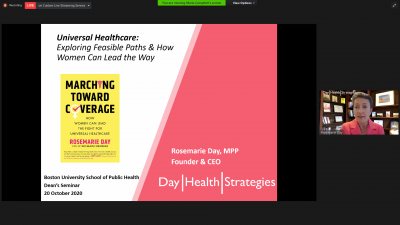As COVID-19 continues to push health care discussions to the forefront of Americans’ minds, experts are re-examining ways to better the country’s health care system.

One such expert is Rosemarie Day, the founder and CEO of Day Health Strategies. Boston University’s School of Public Health held the discussion “Marching Toward Coverage: How Women Can Lead the Fight for Universal Healthcare” on Wednesday, featuring Day, who published a book by the same name.
Before founding Day Health Strategies, which seeks to lower the financial burden of health care, Day was the COO for the Massachusetts Medicaid program, where she worked to lower the uninsured rate to 2 percent in the Commonwealth — the first state to achieve these numbers.
Through her experiences as a cancer survivor with adequate health insurance, Day said in an interview she recognizes the inequities that perpetuate harm in the health care industry.
“I care deeply about folks who are not getting a fair shake in our society, I care deeply about the growing inequality in our society,” Day said. “Everyone in this country deserves [health care], frankly, but I’m passionate about reducing inequality and making this country more fair.”
Day said during the event 26,000 people die every year in the United States because they are uninsured, according to pre-pandemic statistics, and about 200 African Americans die every day for the same reason.
Due to these faults with the country’s health care system, those who enter a hospital may not get the same important care that could save their life, Day said.
“If you’re in an auto accident and you’re bleeding, they have to take you in the ER, but they don’t have to do lots of extras for you if you don’t have insurance coverage,” Day said. “There’s plenty of studies that show a different mortality rate for those who have insurance coverage, and those who don’t, even when they’re in the same exact status otherwise in terms of injury.”
Event moderator Sarah Gordon, an assistant professor of health law, policy and management, lived in Utah in 2018. That year, she said, she witnessed a group of three or four women successfully push for Medicaid expansion on the state’s ballot.
“People think, ‘Oh, I can’t really change anything,’” Gordon said in an interview. “But these women basically launched a campaign that gave 50,000 people health insurance coverage.”
Gordon said she believes average Americans are regularly exposed to the high health care costs that are making coverage unattainable, and those who are not politically engaged are beginning to be personally affected.
“Particularly with the exacerbation of COVID and the fact that it’s completely deplorable to think that there would be people who don’t have health insurance during a pandemic,” Gordon said, “I think that there’s so much happening that’s going to push the momentum forward.”
While anxiety is high in light of the country’s election and future, Day said threats against former President Barack Obama’s Affordable Care Act by the current presidential administration are also frightening.
“On top of that, you have somebody as hateful as Donald Trump get elected with a goal of repealing the Affordable Care Act, take health care away from people, just seemed so mean,” Day said. “I just couldn’t stand it.”
Because the U.S. is one of the only developed countries without universal health care initiatives in place, Gordon said, these discussions are important. And now, with an election less than two weeks away, she said, Day’s lecture was vital.
“Health care is really important, and both parties, no matter what happens with this presidential election, there’s a lot of demand for elected officials to make progress on health care,” Gordon said in an interview.
In her closing remarks, Day said there is a stark juxtaposition between the U.S. and other nations when it comes to health care coverage.
“I think our country’s in a bit of an embarrassing situation. That’s putting it mildly,” Day said. “We really have it within our capacity to do better, and I’m pointing the way for one of those paths.”



























































































































Karen • Oct 23, 2020 at 2:06 pm
This article notes: Day said during the event 26,000 people die every year in the United States because they are uninsured, according to pre-pandemic statistics, and about 200 African Americans die every day for the same reason.
So, 26,000 non-Black people annually PLUS 73,000 Black Americans annually? Or…?